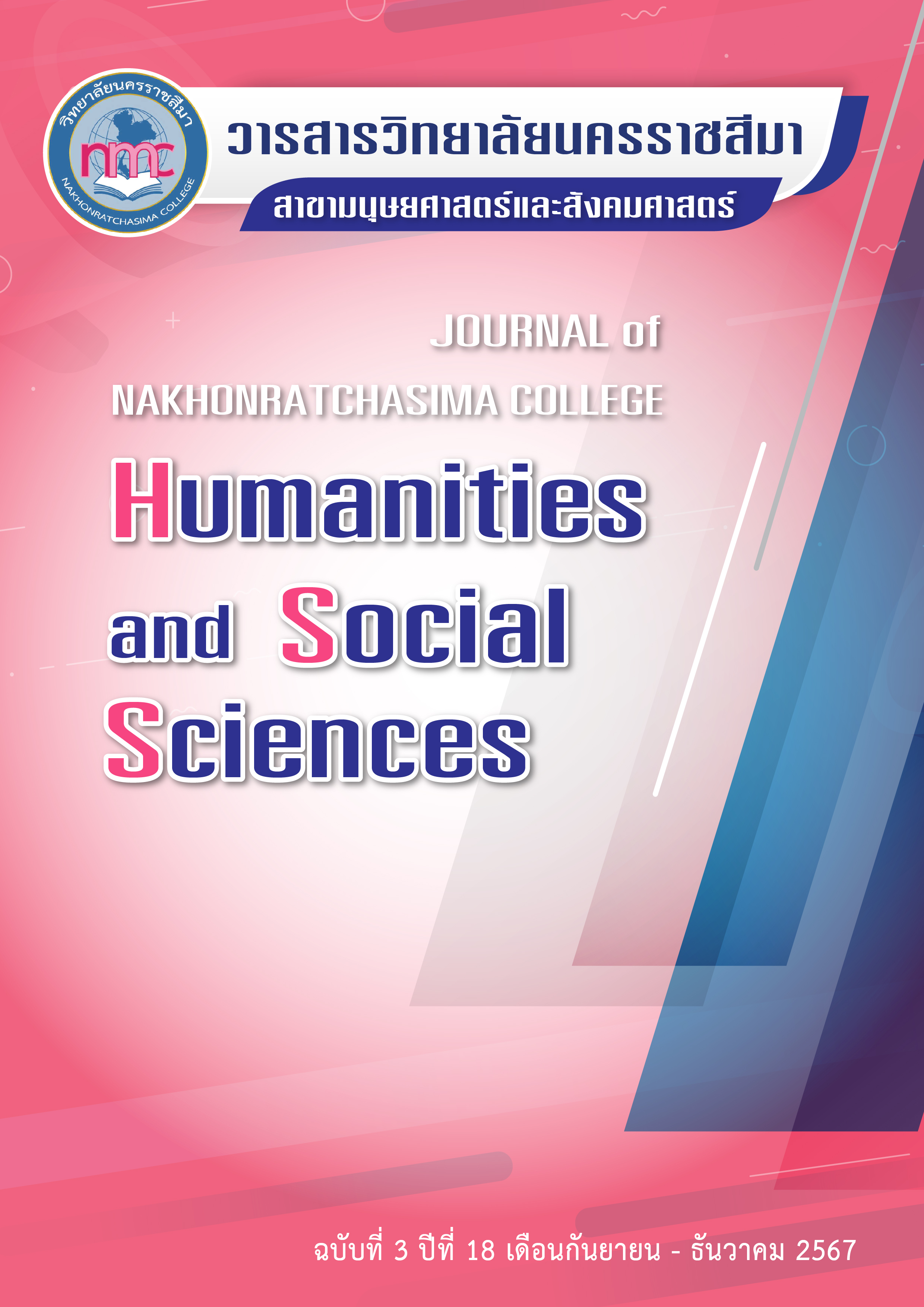Antecedents of Energy-saving Behaviors in Thailand: A Study in Samut Sakhon Province
คำสำคัญ:
Energy-saving behaviors, Structural Equation Modeling, Environmental attitude, Environmental concern, Demographicsบทคัดย่อ
This research aims to examine the level of energy-saving behaviors of Thai adults and investigate the impact of demographic (age, gender, education, and income) and psychological (environmental concern and environmental beliefs) factors on energy-saving behaviors. The research uses Stata software to conduct a quantitative analysis on a secondary dataset collected from Samut Sakhon province. This study analyzed the proposed models using structural equation modeling (SEM). The results were as follows: 1) The respondents often performed energy-saving behaviors, firmly believed in the importance of nature, and were moderately concerned about the environment; 2) Environmental concerns and beliefs have direct and positive impacts on energy-saving behaviors; 3) Environmental concerns and beliefs mediate the effects of demographic factors on energy-saving behaviors. This study provides implications for marketing practitioners and policymakers in creating effective strategies to encourage specific market segments to perform energy-saving behaviors.
เอกสารอ้างอิง
Abeliotis, K., Koniari, C., & Sardianou, E. (2010). The profile of the green consumer in Greece. International Journal of Consumer Studies, 34(2), 153-160.
Carrington, M. J., Neville, B. A., & Whitwell, G. J. (2014). Lost in translation: Exploring the ethical consumer intention–behavior gap. Journal of Business Research, 67(1), 2759-2767.
Casaló, L. V., Escario, J. J., & Rodriguez-Sanchez, C. (2019). Analyzing differences between different types of pro-environmental behaviors: Do attitude intensity and type of knowledge matter? Resources, Conservation and Recycling, 149, 56-64.
Chen, X., Peterson, M. N., Hull, V., Lu, C., Lee, G. D., Hong, D., & Liu, J. (2011). Effects of attitudinal and sociodemographic factors on pro-environmental behaviour in urban China. Environmental Conservation, 38(1), 45-52.
Dunlap, R. E. (2008). The new environmental paradigm scale: From marginality to worldwide use. The Journal of Environmental Education, 40(1), 3-18.
Electricity Generating Authority of Thailand (2024). How to Save Energy for All (in Thai). Retrieved October 1, 2024, from https://www.egat.co.th/home/save-energy-for-all-20220830/
Energy Policy and Planning Offices (2022). Guideline of How to Reduce Energy Consumption in Public Offices (in Thai). Retrieved October 1, 2024, from https://www.eppo.go.th/index.php/en/component/k2/item/17927-news-230365-01
Evans, G. W., Brauchle, G., Haq, A., Stecker, R., Wong, K., & Shapiro, E. (2007). Young children's environmental attitudes and behaviors. Environment and Behavior, 39(5), 635-658.
Gifford, R., & Nilsson, A. (2014). Personal and social factors that influence pro‐environmental concern and behaviour: A review. International Journal of Psychology, 49(3), 141-157.
Heyl, M., Moyano Díaz, E., & Cifuentes, L. (2013). Environmental attitudes and behaviors of college students: A case study conducted at a Chilean university. Revista latinoamericana de psicología, 45(3), 487-500.
Hu, L. T., & Bentler, P. M. (1999). Cutoff criteria for fit indexes in covariance structure analysis: Conventional criteria versus new alternatives. Structural Equation Modeling: a Multidisciplinary Journal, 6(1), 1-55.
Kaiser, F. G., Oerke, B., & Bogner, F. X. (2007). Behavior-based environmental attitude: Development of an instrument for adolescents. Journal of Environmental Psychology, 27(3), 242-251.
Kaiser, F. G., Ranney, M., Hartig, T., & Bowler, P. A. (1999). Ecological behavior, environmental attitude, and feelings of responsibility for the environment. European Psychologist, 4(2), 59.
Lee, Y. K., Kim, S., Kim, M. S., & Choi, J. G. (2014). Antecedents and interrelationships of three types of pro-environmental behavior. Journal of Business Research, 67(10), 2097-2105.
Manoli, C. C., Johnson, B., & Dunlap, R. E. (2007). Assessing children's environmental worldviews: Modifying and validating the New Ecological Paradigm Scale for use with children. The Journal of Environmental Education, 38(4), 3-13.
Mayer, F. S., & Frantz, C. M. (2004). The connectedness to nature scale: A measure of individuals’ feeling in community with nature. Journal of Environmental Psychology, 24(4), 503-515.
Mertig, A. G., & Dunlap, R. E. (2001). Environmentalism, new social movements, and the new class: A cross‐national investigation. Rural Sociology, 66(1), 113-136.
Olli, E., Grendstad, G., & Wollebaek, D. (2001). Correlates of environmental behaviors: Bringing back social context. Environment and Behavior, 33(2), 181-208.
Patel, J., Modi, A., & Paul, J. (2017). Pro-environmental behavior and socio-demographic factors in an emerging market. Asian Journal of Business Ethics, 6, 189-214.
Pointon, P. (2014). ‘The city snuffs out nature’: young people’s conceptions of and relationship with nature. Environmental Education Research, 20(6), 776-794.
Sánchez, M., López-Mosquera, N., & Lera-López, F. (2016). Improving pro-environmental behaviours in Spain. The role of attitudes and socio-demographic and political factors. Journal of Environmental Policy & Planning, 18(1), 47-66.
Schultz, P. W. (2000). New environmental theories: Empathizing with nature: The effects of perspective taking on concern for environmental issues. Journal of Social Issues, 56(3), 391–406.
Schultz, P. W., Oskamp, S., & Mainieri, T. (1995). Who recycles and when? A review of personal and situational factors. Journal of Environmental Psychology, 15(2), 105-121.
Scott, D., & Willits, F. K. (1994). Environmental attitudes and behavior: A Pennsylvania survey. Environment and Behavior, 26(2), 239-260.
Singh, P., Sahadev, S., Oates, C. J., & Alevizou, P. (2020). Pro-environmental behavior in families: A reverse socialization perspective. Journal of Business Research, 115, 110-121.
Steg, L., Bolderdijk, J. W., Keizer, K., & Perlaviciute, G. (2014). An integrated framework for encouraging pro-environmental behaviour: The role of values, situational factors and goals. Journal of Environmental Psychology, 38, 104-115.
White, K., Habib, R., & Hardisty, D. J. (2019). How to SHIFT consumer behaviors to be more sustainable: A literature review and guiding framework. Journal of Marketing, 83(3), 22-49.
ดาวน์โหลด
เผยแพร่แล้ว
รูปแบบการอ้างอิง
ฉบับ
ประเภทบทความ
สัญญาอนุญาต
จรรยาบรรณผู้เขียนบทความ
ผู้เขียนบทความต้องรับรองว่าบทความนี้ไม่เคยตีพิมพ์ในวารสารใดหรือสิ่งพิมพ์อื่นๆ มาก่อน ต้องไม่คัดลอกผลงานผู้อื่นมาปรับแต่งเป็นบทความของตน และไม่ได้อยู่ระหว่างการเสนอเพื่อพิจารณาตีพิมพ์ อีกทั้งยอมรับหลักเกณฑ์การพิจารณาและการตรวจแก้ไขบทความต้นฉบับโดยกองบรรณาธิการวารสารวิทยาลัยนครราชสีมา สาขามนุษยศาสตร์และสังคมศาสตร์
บทความทุกเรื่องได้รับการตรวจพิจารณาทางวิชาการโดยผู้ทรงคุณวุฒิที่มีประสบการณ์และมีความเชี่ยวชาญตรงตามสาขาของบทความ ซึ่งผู้เขียนต้องแก้ไขตามคำแนะนำของผู้ทรงคุณวุฒิภายในระยะเวลาที่กำหนด หากไม่เป็นไปตามกำหนดกองบรรณาธิการขอสงวนสิทธิ์และยกเลิกการตีพิมพ์โดยจะแจ้งให้ทราบต่อไป
ข้อความที่ปรากฏในบทความของวารสารนี้เป็นความคิดเห็นของผู้เขียนซึ่งไม่เกี่ยวข้องกับวิทยาลัยนครราชสีมาแต่อย่างใด และกองบรรณาธิการขอสงวนสิทธิ์ในการพิจารณาและตรวจประเมินบทความเพื่อตีพิมพ์ในวารสารของวิทยาลัยนครราชสีมา สาขามนุษยศาสตร์และสังคมศาสตร์



